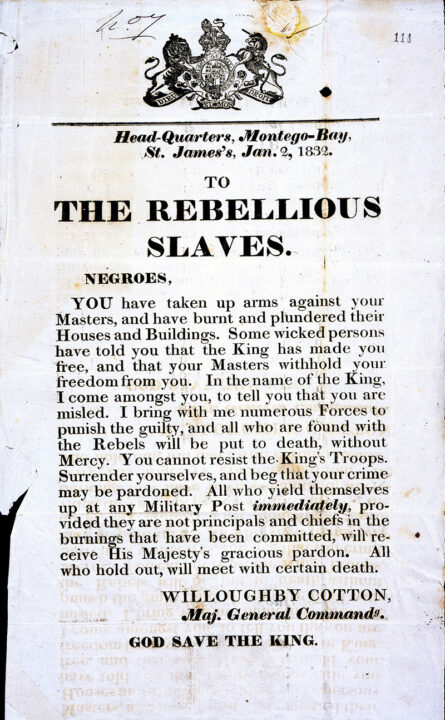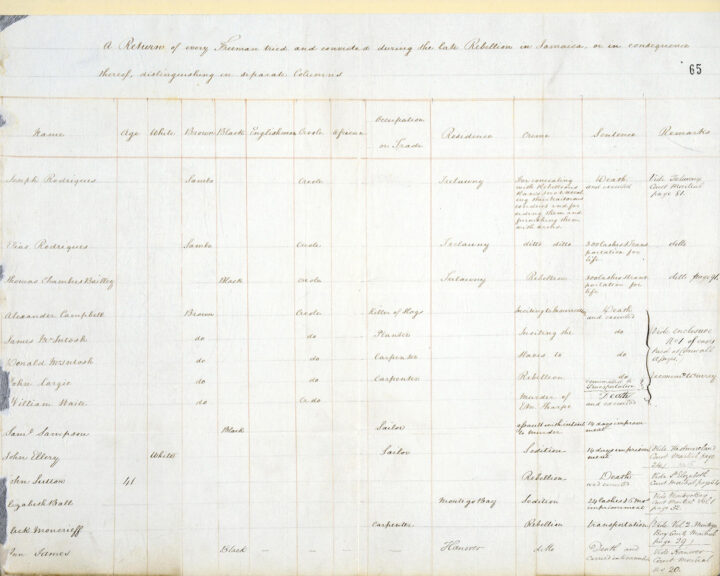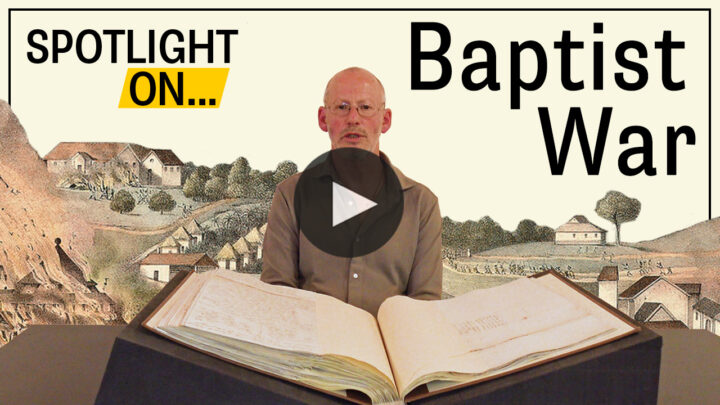
Colonial Office: Records relating to the Baptist War, 1831
We hope you enjoyed watching our Education Service video with Records Specialist Daniel Gilfoyle looking at records from the Colonial Office. This video focusses on two documents relating to the Baptist War in 1831 led by Samuel Sharpe against slavery in Jamaica which shed light on resistance to slavery in the British Caribbean.
Our collections contain ideas, language and imagery from original records which reflect historical perspectives and attitudes. Some may be considered offensive. However, we think it important to show them as accurate representations of the record to help us understand the past.
Download Spotlight On: Baptist War Resource Pack
Now try and answer the following questions:
- What was the Colonial Office?
- When was it created?
- What type of sources can be found in the Colonial Office collection?
- What does this reveal about the range of material available?
- What is the code of the document examined in the video?
Document 1
- What does the code reveal about the document examined in the video?
- What is the date of the document examined?
- What type of document is it?
- What events does the document concern?
- Why do you think this document was created in the form of a poster?
- What does the language used in the poster reveal about the attitude of British colonial authorities in Jamaica towards the enslaved?
- How are font size, use of capital letters, and italics used within the poster to threaten those involved in this rebellion against slavery?
- What information does this poster not reveal about these events? Can you explain why this is the case?
- What does the poster infer about the British Empire at that time?
Document 1:
A poster entitled ‘To the Rebellious Slaves’. This was a despatch sent from Jamaica to the Colonial Office in London, 1832. Catalogue ref: CO 137/181

Transcript
Head-Quarters, Montego-Bay, St James’s Jan. 2, 1832.
TO THE REBELLIOUS SLAVES.
NEGROES,
YOU, have taken up arms against your Masters, and have burnt and plundered their Houses and Buildings. Some wicked persons have told you that the king has made you free, and that your Masters withhold your freedom from you. In the name of the King, I come amongst you, to tell you that you are misled. I bring with me numerous Forces to punish the guilty, and all who are found with the Rebels will be put to death, without Mercy. You cannot resist the King’s Troops. Surrender yourselves, and beg that your crime may be pardoned. All who yield themselves up at any Military Post immediately, provided they are not principals and chiefs in the burnings that have been committed, will receive His Majesty’s gracious pardon. All who hold out, will meet with certain death.
WILLOUGHBY COTTON
[Major] General [Commander]
GOD SAVE THE KING
Document 2
Extract from a return of individuals or ‘freeman’ tried and sentenced for their involvement in the Baptist War. Catalogue ref: CO 137/185
A return of every Freeman tried and convicted during the late Rebellion in Jamaica or in consequence thereof, distinguishing in separate columns.
Some of the language used in this document to categorise different individuals is considered racist.
The term ‘Race’ can be considered as a social construct (meaning something that has come about through complex social and political processes, rather than being grounded in science). Therefore, language relating to it depends on its context in time and location and is often contested and frequently problematic.
The following definitions provide some information on how the different social groups described in this document, were racialised (given often negatively evaluated characteristics on account of their ethnic backgrounds).
Definitions
‘’Sambo’ as a term was used in a broader sense as a derogatory term for black people, though here it seems to be used as a racial category to refer a person of mixed African and European or Indigenous American ancestry in Spanish/Latin America.
‘Brown’ is used as an umbrella term here to refer to those listed as ‘sambo’ and ‘brown’ itself. There do not appear to be any other terms used to describe people in the document. ‘Brown’ appears as a distinct category from Creole (rooted in the Americas) but incorporates Sambo (rooted in Spanish America), so it would be those of mixed heritage from outside the Caribbean.
‘Creole’ as a term was used to describe people of mixed European and Black African descent born in the colonies due to migration patterns, often born in the Americas. [Creole also can mean a language that has arisen from simplifying and mixing different languages.]
‘Black’ as a term has different meanings in different contexts. In this context it is used to refer to people of African descent. In European sources, the term “black” has been used to describe many different non-African people of colour.
‘White’: meaning a white European colonist.
‘Freemen’: could refer to different people of any race who were free under the law i.e. not a serf or enslaved person. Freemen could work anywhere; they could work on the plantations, but also in towns or docks etc. They were essentially not enslaved. It seems that there were according to this document, some freemen who supported the rebellion of enslaved – it is not typically a racialized term, and they could be black or white.
Vide: This is a Latin legal term which means: ‘see’ other information relating this matter.
- What does the language used in this document to categorise and describe individuals reveal about attitudes towards race at the time?
- What does this document reveal about attitudes towards crime and punishment?
- What does this document reveal about the British Empire?
- Can you see what information may be lacking from this source?
- What is the advantage of looking at this document alongside Document 1?
- What other sources beyond Colonial Office records, would be important to explore when studying this topic?
- Find out about more about the significance of Samuel Sharpe and his leadership of Baptist War against slavery in Jamaica.
- Use The National Archives research guide on Slavery and the British Transatlantic slave trade to find other records.
Document 2:

Transcript
Read transcript for Document 2
Connections to curriculum
Key stage 3
Ideas, political power, industry and empire: Britain, 1745-1901: Britain’s transatlantic slave trade: its effects and its eventual abolition
Key stage 4
AQA GCSE History: Britain: Migration, empires and the people: c790 to the present day
Related Resources
- Bussa’s rebellion
- How and why did the enslaved Africans of Barbados rebel in 1816?
- Slavery
- How did the Abolition Acts of 1807 and 1833 affect the slave trade?
- Black, Asian and Minority Ethnic Histories
- This resource contains a hyperlinked list of National Archives current resources for Black, Asian and Minority Ethnic histories on The National Archives website.



